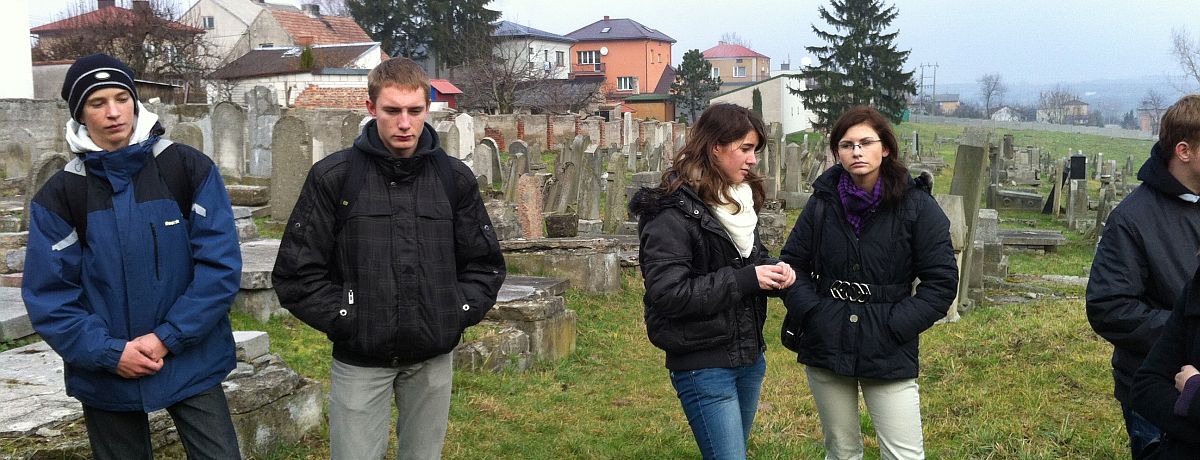| 2012 |
Łomża
High School and High School of Economics Complex No 6


| 2012 |
Łomża is a medium-sized town in the north-east Poland. The large building complex at Kopernika Street houses the High School and the High School of Economics. Two smiling blondes wearing Forum for Dialogue t-shirts enter one of the classrooms. Educators move tables away and put them closer to walls. This won’t be another hour of simple lecture. A group of the first-year students are to begin the School of Dialogue workshops. During a series of meetings with educators, young people are surprised to discover that before the outbreak of the World War II, Jews constituted 39% of the town’s population. They had lived in Łomża and the surroundings since the 15th century. A synagogue used to stand at the corner of today’s Giełczyńska and Senatorska Streets, now a plaque is placed there with an inscription in Hebrew reading: “In Memory of the Jews of the Łomża Region”. Another synagogue stood by the hospital in Szkolna and Senatorska Streets. The hospital building next door now houses the High School No 3. Peltynowicz, Bengeldorf, Rubinsztejn, Ofenberg had their shops in Łomża. They traded in combs, hairpins, salt, fish, iron, glass, leather in the Old Market and in the town center.
When students are taken on a walk by the Forum for Dialogue educators, they discover history of places which they pass by every day but know very little about. They will later write: “This project allowed us to discover places connected with Jewish community, and of which we never heard before.”
Students will not only discover places but also people for whom the Jewish history of Łomża is important. In October, the school host descendants of Jews from Łomża, the Margolis Family from Chicago. The School of Dialogue participants find out that the ancestors of the Margolis family lived at Stary Rynek 8 where a shop with clothing textiles was located. The meeting with the American guests proves to be a great opportunity for discussion, and students, inspired by these discoveries, continue their search for traces of the local Jewish community. They go to libraries, the state archives and the Museum of Northern Mazowsze. They meet with Leszek Taborski who works at the Museum of Łomża. Boys want to know more about Jewish sport teams from Łomża.

They ask older town residents about their recollections of times before the war. While talking to her grandmother, one of the students finds out that the grandmother’s sister was awarded the medal of the Righteous Among the Nations.
It is freezing and snowing on December 3, 2012. One of the students is carrying flowers carefully wrapped in a protective film. In spite of the bad weather, students of the same age who were invited for the walking tour around Jewish Łomża gather at the meeting point. Participants of the School of Dialogue workshops take up the roles of tour guides and share the knowledge acquired during workshops and information searches. They are proud of themselves. They guide other students to the place where a mikveh was, where before the war a synagogue stood at the market square.
They read childhood memories of George Puchala (Puchalski) who in 1920’s and 1930’s lived at Stary Rynek 4 and attended the Tadeusz Kościuszko Junior High School. They head for Jana z Kolna Street where Yeshiva was located. They visit Jewish cemeteries in Rybaki and Boczna Streets. They lay flowers by the commemorative plaque at Senatorska 6. They are happy that they have prepared the tour on their own, that their peers came to the tour and that they showed interest in what was presented to them and said.
Participation in the program made students aware of their history and generated the need to share it with others. They also learned how to assign tasks, cooperate and implement their plans.
We discovered how Łomża looked like before the war and how Jews were treated during the occupation. The meeting with the Margolis family meant a lot to us. This project allowed us to discover places connected with Jewish community, and of which we never heard before.
Pyśka and Paulina, workshops participants

School:
High School and High School of Economics Complex No 6
Students:
1st year students
Teacher:
Arkadiusz Bałazy
Expert:
Leszek Taborski
Educators:
Aleksandra Dybkowska, Katarzyna Pietrzak
School of Dialogue program in Łomża was made possible by the support from BARBARA, LARY, SAMANTHA and JOSHUA MARGOLIS, NANCY and PAUL MADDRELL.
In appreciation to the Conference on Jewish Material Claims Against Germany (Claims Conference) for supporting this educational program. Through recovering the assets of the victims of the Holocaust, the Claims Conference enables organizations around the world to provide education about the Shoah and to preserve the memory of those who perished.

In appreciation to Friends of the Forum for supporting the School of Dialogue educational program.
